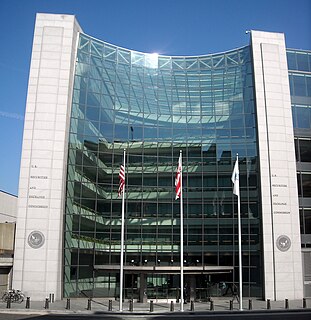 W
WThe U.S. Securities and Exchange Commission (SEC) is a large independent agency of the United States federal government, created in the aftermath of the Wall Street Crash of 1929. The primary purpose of the SEC is to enforce the law against market manipulation.
 W
WThe bill H.R. 701, an act to amend a provision of the Securities Act of 1933 directing the Securities and Exchange Commission to add a particular class of securities to those exempted under such Act to provide a deadline for such action, was a bill introduced into the United States House of Representatives in the 113th United States Congress. It was introduced on February 14, 2013 by Rep. Patrick McHenry (R-NC). The bill would amend the Securities Act of 1933 to set a new deadline regarding domestic securities for the Securities and Exchange Commission (SEC).
 W
WGenerally Accepted Accounting Principles is the accounting standard adopted by the U.S. Securities and Exchange Commission (SEC). While the SEC previously stated that it intends to move from U.S. GAAP to the International Financial Reporting Standards (IFRS), the latter differ considerably from GAAP and progress has been slow and uncertain. More recently, the SEC has acknowledged that there is no longer a push to move more U.S companies to IFRS so the two sets of standards will "continue to coexist" for the foreseeable future.
 W
WA Matter Under Inquiry is a term used by the United States Securities and Exchange Commission to describe preliminary investigations it makes into alleged financial fraud in the companies that it is responsible for regulating. MUIs may lead to more serious formal investigations, or they may be closed and no further action taken.
 W
WThe U.S. Securities and Exchange Commission (SEC) whistleblower program went into effect on July 21, 2010, when the President signed into law the Dodd-Frank Wall Street Reform and Consumer Protection Act. The same law also established a whistleblower incentive program at the Commodity Futures Trading Commission to incentivize reporting of violations of the Commodity Exchange Act, which is run by former senior SEC enforcement attorney Christopher C. Ehrman. The SEC Whistleblower Program rewards people who submit tips related to violations of the federal securities laws. The program offers robust employment protections, monetary awards and the ability to report anonymously. SEC whistleblowers are entitled to awards ranging from 10 to 30 percent of the monetary sanctions collected, which are paid from a replenishing Investor Protection Fund. Since 2011, whistleblower tips have enabled the SEC to recover over $2 billion in financial penalties from wrongdoers. The SEC has awarded more than $700 million to whistleblowers.
 W
WThe SEC Regulatory Accountability Act is a bill that was introduced into the United States House of Representatives in the 113th United States Congress. The bill would amend the Securities Exchange Act of 1934 to give new directions to the Securities and Exchange Commission (SEC) governing its regulation creation and amendment process. The SEC would be required to assess the significance of the problem they are considering addressing, determine whether the estimated costs would outweigh the estimated benefits, and identify alternatives to their proposed regulation. The bill is intended to help protect the financial sector from excessive, burdensome regulations created by the SEC. The bill would do this by ordering the SEC to conduct a cost-benefit study before issuing any new rules to ensure that the expected benefits of the new rule would outweigh the expected costs of imposing it.
 W
WThe Securities Act of 1933, also known as the 1933 Act, the Securities Act, the Truth in Securities Act, the Federal Securities Act, and the '33 Act, was enacted by the United States Congress on May 27, 1933, during the Great Depression and after the stock market crash of 1929. It is an integral part of United States securities regulation. It is legislated pursuant to the Interstate Commerce Clause of the Constitution.
 W
WThe Securities Exchange Act of 1934 is a law governing the secondary trading of securities in the United States of America. A landmark of wide-ranging legislation, the Act of '34 and related statutes form the basis of regulation of the financial markets and their participants in the United States. The 1934 Act also established the Securities and Exchange Commission (SEC), the agency primarily responsible for enforcement of United States federal securities law.
 W
WJordan Andolini Thomas is an American attorney, writer, speaker and media commentator. He is a partner and Chair of the Whistleblower Representation Practice at Labaton Sucharow LLP (2011–present), where he represents whistleblowers reporting violations of the federal securities laws to the U.S. Securities and Exchange Commission (SEC).